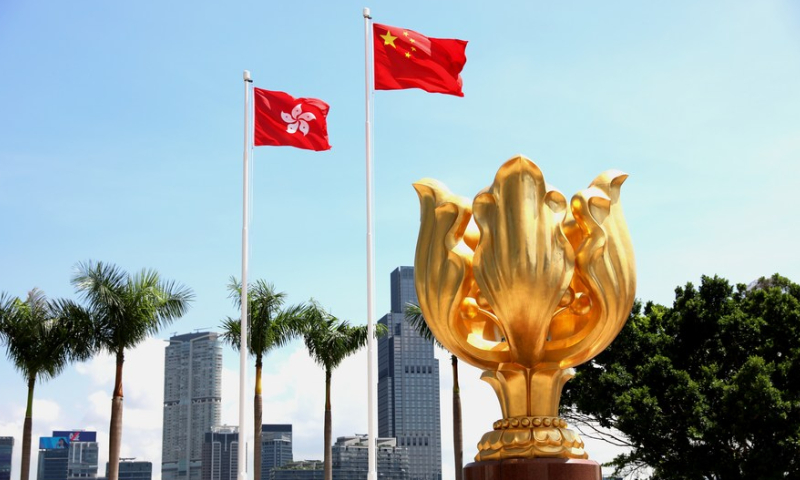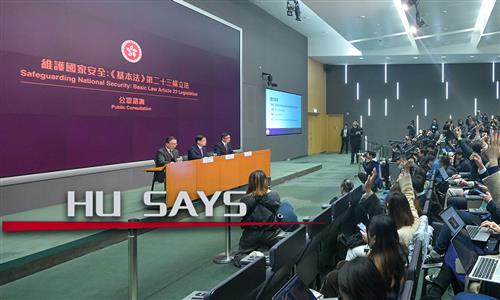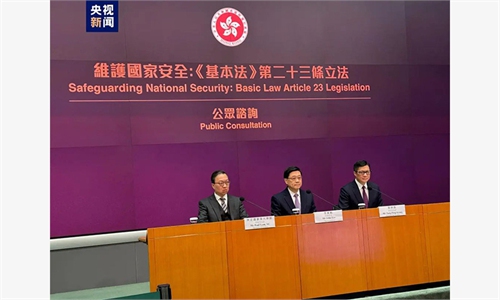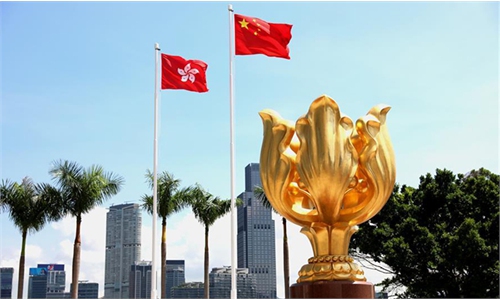Article 23 legislation enters sprint stage; HK should no longer wait: Global Times editorial

Photo taken on July 14, 2020 shows the Golden Bauhinia Square in South China's Hong Kong. Photo: Xinhua
On January 30, Hong Kong Special Administrative Region (HKSAR) Chief Executive John Lee Ka-chiu, announced during a press conference that the HKSAR government commenced the public consultation on the Basic Law Article 23 legislation and invites public views in this regard. The consultation period will end on February 28. This signifies that the legislation of Basic Law Article 23 has officially entered the sprint stage, a long-awaited development anticipated by patriots who love both the country and Hong Kong. It is also a welcome step for various sectors of Hong Kong society.
It has been over 26 years since Hong Kong's return to the motherland, and the Basic Law has been in effect for more than 26 years. However, the legislation of Article 23 has remained unresolved, becoming a constitutional responsibility that Hong Kong has yet to fulfill. The 26-year period is long enough to clarify all cognitive obstacles and ambiguous areas surrounding the legislation of Article 23. Various controversies that seemed loud at the time have revealed their most genuine nature through the erosion of time and practical experiences. The occurrence of the Hong Kong version of the "color revolution" during the violent riots in 2019 is closely related to the absence of Article 23 legislation, indicating the necessity and urgency of enacting this legislation.
Lee stated, "we [Hong Kong] cannot afford to wait." Hong Kong's Secretary for Justice Paul Lam Ting-kwok also described the legislation of Article 23 as "a piece of homework that is long overdue," and completing the legislation is akin to repaying "a debt that must be settled," which can be considered a vivid analogy. Without plugging this loophole and addressing this shortcoming, the stability and prosperity of Hong Kong's society always face threats, and anti-China and destabilizing forces will constantly find opportunities. They have not given up using Hong Kong as a point of infiltration, posing a risk to the national security of the entire China. The sooner the legislation of Article 23 is completed, the more beneficial it is for the HKSAR government and the entire Hong Kong society to focus on handling economic and livelihood matters. This has become a consensus among the people of Hong Kong. Upon completing this constitutional task that Hong Kong should have accomplished earlier, the prosperity and stability of Hong Kong will have a more solid foundation.
To distinguish patriots who love both the country and Hong Kong from anti-China and destabilizing forces, there is a very intuitive criterion: the attitude toward the legislation of Article 23. While initially, some individuals might have had concerns and misunderstandings due to insufficient understanding of the legislation of Article 23 as well as the internal and external situation in Hong Kong, these cognitive problems should now be resolved.
Some technical issues have been repeatedly addressed by the HKSAR government, experts, scholars, and the media, such as the relationship, similarities and differences between the Article 23 legislation and the national security law in Hong Kong, as well as the compatibility between Hong Kong's openness and internationalization. After extensive discussions in the public sphere, these issues have become common knowledge and cannot be used as excuses or obstacles against the legislation of Article 23.
In other words, those who still strongly oppose the Article 23 legislation today are primarily driven by their stance, often being anti-China, destabilizing forces and their external supporters. They certainly hope to maintain this national security loophole to facilitate their anti-China activities. For them, without the Hong Kong national security law and the Article 23 legislation, Hong Kong would be like an "unguarded city." We have witnessed their audacity during the 2019 anti-extradition bill protests, which still haunt many Hong Kong citizens. The intentions of this group of people opposing the legislation of Article 23 are extremely malicious.
Hong Kong has already entered a new stage in which it has restored order and is set to thrive. However, anti-China and destabilizing forces in Hong Kong have not disappeared. Some have sought refuge in Western countries, some have changed their tactics, and some are temporarily dormant, but they are all waiting for an opportunity to resurface. Foreign anti-China forces are eagerly seeking opportunities. The Article 23 legislation is entering its sprint stage, which will greatly stimulate them. We need to be psychologically prepared and have countermeasures against their tactics of inciting trouble, demonizing and attacking in the public opinion field. The HKSAR government needs to maintain its determination and steadfastly promote the legislative process. It is gratifying to see that compared to previous years, Hong Kong citizens are now more clear-headed and rational, less easily swayed by anti-China and destabilizing forces.
The promulgation and implementation of the national security law in Hong Kong has restored order and ended chaos in Hong Kong. The Article 23 legislation, which complements the Hong Kong national security law, has added another cornerstone to Hong Kong's economic development and social stability. A stable political and economic environment, along with increasingly consolidated rule of law, will serve as the foundation and guarantee for Hong Kong's prosperous development and continuous openness, and will also attract more global investors.




